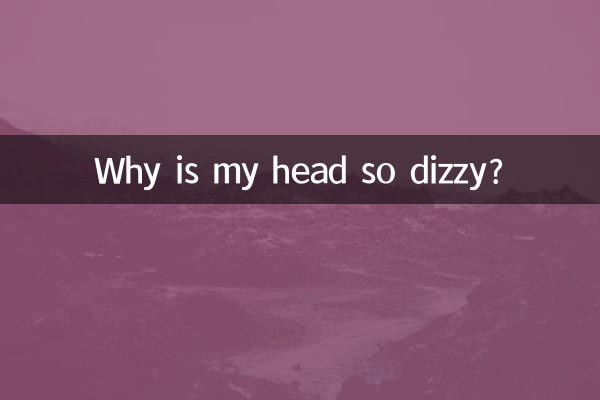Why is my head so dizzy?
Recently, dizziness has become a hot health topic that concerns many people. Whether it is factors such as high work pressure, fast pace of life, or weather changes, dizziness symptoms may occur. This article will combine the hot topics and hot content on the Internet in the past 10 days to provide you with a detailed analysis of the possible causes of dizziness, relevant data and coping methods.
1. Common causes of dizziness

Dizziness is a common discomfort that can be caused by a variety of factors. The following are the most frequently discussed causes of dizziness among netizens recently:
| Reason type | Proportion | Typical symptoms |
|---|---|---|
| hypotension | 28% | Dizziness and dark eyes when standing |
| anemia | twenty two% | Fatigue and pale complexion |
| cervical spine problems | 18% | Dizziness worsens when turning head |
| Inner ear diseases | 15% | Dizzy feeling, nausea |
| anxiety/stress | 12% | Dizziness worsens when nervous |
| other reasons | 5% | It depends on the situation |
2. Recent popular topics related to dizziness
According to network-wide data monitoring, high-frequency discussion topics related to dizziness in the past 10 days include:
| topic | Discussion popularity | main focus |
|---|---|---|
| Weather changes cause dizziness | high fever | Effects of air pressure changes on physical health |
| office dizziness syndrome | Middle to high | The effects of prolonged sitting and air-conditioned environment |
| Cell phone use and dizziness | middle | Effects of blue light and prolonged head bowing |
| The relationship between diet and dizziness | middle | Problems such as hypoglycemia and dehydration |
| Dizziness due to sequelae of COVID-19 | low middle | Discomfort symptoms during recovery period |
3. Countermeasures for dizziness
For different types of dizziness, experts and netizens have shared the following effective coping methods:
1.Immediate mitigation measures: When you feel dizzy, you should sit or lie down immediately to avoid falling; you can try to take a deep breath to relax your body and mind; add appropriate amount of water.
2.Long-term improvement methods:
| method | Applicable people | Effect |
|---|---|---|
| Regular schedule | all groups | significant improvement |
| moderate exercise | Sedentary people | significant improvement |
| diet modification | Anemia/hypoglycemia | targeted improvements |
| Cervical spine health care | People with cervical spine problems | significant relief |
| psychological counseling | Anxious/stressed person | long term improvement |
4. When Do You Need Medical Treatment?
While most dizziness is benign, the following conditions require immediate medical attention:
1. Dizziness accompanied by severe headache and vomiting
2. Confusion and slurred speech
3. Limb weakness or numbness
4. Lasts more than 24 hours
5. Recurrent attacks with unknown cause
According to recent medical data, about 15% of patients who seek treatment for dizziness require further examination and treatment, so it is very important to seek medical treatment in time.
5. Lifestyle suggestions to prevent dizziness
1.Get enough sleep: Guarantee 7-8 hours of high-quality sleep every day
2.Eat properly: Eat regularly and quantitatively to avoid overeating
3.moderate exercise: At least 150 minutes of moderate-intensity exercise per week
4.manage stress:Learn relaxation techniques such as meditation and deep breathing
5.Regular physical examination: Especially people over 40 years old
Although dizziness is common, most conditions can be effectively improved by understanding the cause and taking appropriate measures and prevention. If symptoms persist or worsen, it is important to seek medical advice promptly for professional diagnosis and treatment.